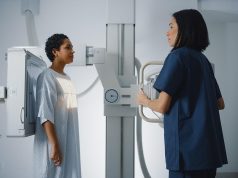Test led to increase in number of patients with identified G7 biomarker, reduction in turnaround time
FRIDAY, March 1, 2019 (HealthDay News) — A cell-free DNA (cfDNA) analysis using a 73-gene panel can successfully be used to identify “Guideline-7” (G7) biomarkers in metastatic non-small cell lung cancer (mNSCLC), according to research scheduled to be presented at the annual meeting of the American Association for Cancer Research, to be held from March 29 to April 3 in Atlanta.
Natasha Leigh, M.D., from the Princess Margaret Hospital in San Diego, and colleagues enrolled 282 patients with previously untreated nonsquamous mNSCLC undergoing standard-of-care tissue genotyping.
The researchers identified a G7 biomarker in tissue in 60 patients. With use of cfDNA, the number of patients with an identified G7 biomarker increased 48 percent to 89 patients, including those with negative, not-assessed, or quantity-not-sufficient results in tissue. Twenty-four (12.4 percent) of the remaining 193 patients without a G7 biomarker by tissue or cfDNA had an activating KRAS alteration identified in tissue alone or concordant with cfDNA; the number of KRAS-positive patients increased from 24 to 92 with cfDNA. For U.S. Food and Drug Administration-approved targets, the positive predictive value was 100 percent for cfDNA versus tissue genotyping. The median turnaround time was significantly lower for cfDNA versus tissue genotyping (nine versus 15 days).
“This study shows that a highly sensitive and specific liquid biopsy should be part of the standard of care for these patients,” a coauthor said in a statement.
The study was funded by Guardant Health.
Copyright © 2019 HealthDay. All rights reserved.








